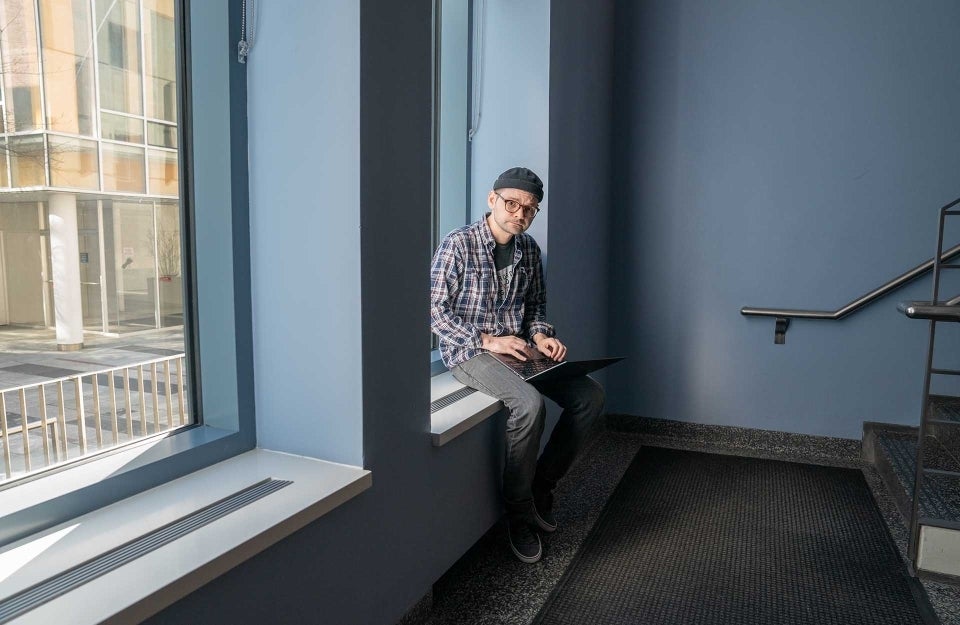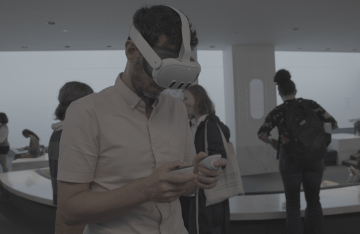Finding New Ways to Evaluate Voters’ Beliefs
In his dissertation research, joint Communication and Political Science doctoral student Nicholas Dias searches for new ways to gauge voter competency.

Nicholas Dias at the Annenberg School
In high school, Nicholas Dias was fascinated by the fact that some information persuades voters to change their political beliefs, while other information doesn’t. So he joined the debate team.
Dias, who grew up in California, received a bachelor’s degree in Communication and Psychology from UC Davis. Hoping to provide voters with useful facts that would inform their beliefs, he then moved to New York to attend Columbia Journalism School. During his time in New York, he found that informing voters wasn’t as interesting to him as understanding how voters process information.
“I realized that in order to answer the questions that I was interested in,” says Dias, “I needed to collect my own data.”
Now Dias satiates his curiosity through research — exploring the dynamics underlying Americans’ political beliefs — as a joint doctoral student at the Annenberg School for Communication and the Department of Political Science at the University of Pennsylvania.
He came to Annenberg in part because scholars were already looking into the questions he was drawn to — why people change their minds about issues, what makes people resistant to accepting some facts, and what role partisan polarization plays in preventing people from persuading one another.
Searching for Competent Voters
As a researcher, Dias has been working with his advisors — Associate Professor of Communication Yphtach Lelkes and Professor Matthew Levendusky in the Department of Political Science — to study partisan polarization. His newer work tries to find better and fairer ways to gauge whether voters are sufficiently informed to make competent decisions when they step into the polling booth.
“Currently, as political scientists, we often use quizzes that ask political knowledge questions like, ‘What party controls the House of Representatives?’ to compute how good their democratic decisions are, how well they're voting, how effectively they're identifying public policies that are consistent with their interests and priorities,” Dias says, “They’re useful, but they force people to conform to a very particular set of expectations about what they should know.”
He and Lelkes have been testing an alternate method of gauging voter knowledge — self-assessments.
“We simply ask people to evaluate themselves in terms of how well they understand particular issues,” Dias says, “rather than inferring what they might know about abortion based on whether they know how many Supreme Court justices there are.”
In 2021, the pair began testing these assessments, asking survey participants about the clarity of their attitudes about issues like requiring public school uniforms and lowering the national voting age. Their initial findings have shown that these self-assessments consistently match – and in some cases outperform – traditional methods of predicting whether voters understand policy issues, like quizzes of political knowledge.
“It turns out that those self-assessments are remarkably good at predicting whether or not people actually seem to understand these issues,” Dias says. “Citizens who believe that they understand an issue are actually better at aligning their attitudes with their core principles as well as identifying each political party’s attitudes on the issue.”
The Power of Values
Dias has also been investigating how political scientists use moral values in their work on voter competence.
“There is no one value that predicts attitudes on every single policy issue. So, depending on the issues that you're looking at, and depending on what you presume to be driving people's attitudes, you can get very, very different impressions of how competent or tuned-in voters are,” he says.
One set of values that he believes has been understudied is concepts of distributive justice — beliefs about how resources should be distributed across people.
In a recent study, he polled a group of 2,000 Americans to see how they believe wealth should be distributed: to reward individual effort (i.e., deservingness), to provide for basic needs (i.e., sufficiency), or to ensure wealth equality (i.e., equality).
He found, interestingly, that participants’ thoughts on wealth distribution turned out to predict their thoughts on other policy issues, just as well as other predictors like demographics and party loyalty.
“My preliminary data suggests that these values matter pretty consistently across policy issues,” he says. “For example, participants who prioritized providing for basic needs over ensuring that effort drives wealth were more likely to support a government insurance plan that covers all medical expenses for everyone.”
Voters are Competent
Dias hopes that if you take anything away from his research, it’s that voters are smarter than you think.
“If you look at the news, you get the impression that every decision a voter makes just comes down to which political party they belong to or which party their parents belonged to,” he says. “But researchers have been forcing voters into boxes that seem sensible to us, and we've failed to recognize the diverse ways in which people can make decisions. When we do a better job of accounting for that diversity, people look a whole lot more capable.”
He admits that he came into graduate school with a bleak view of voting in America. Studying voters has changed that.
“Voters are pretty smart,” he says. “The problem is that we haven't evaluated them appropriately.”



